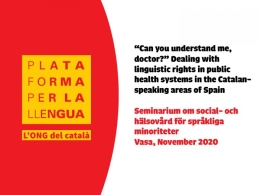Plataforma per la Llengua has taken part in the international seminar on languages in health - "Social and Health Care Services for Linguistic Minorities in Bilingual Settings" - organised by the Åbo Akademi University. The seminar, due to be held in March in Vasa, Finland, but postponed due to COVID-19, was finally held virtually.
The webinar brought together experts on minority languages from all over Europe to deal with the state of the use of those languages in the health field and the discrimination deriving from the violation of language rights. Òscar Adrià Ibáñez, head of language rights at Plataforma per la Llengua, took part in order to explain the situation of Catalan in the area of health all over the territory. Specialists on the rights of the Swedish-speaking minority in Finland, speakers of Irish Gaelic in the Republic of Ireland, Welsh-speakers in Wales and English-speakers in Quebec also took part in the seminar.
The differences shown between the authorities in Catalonia, the Valencian region and the Balearic Islands concerning language requirements and use were among the issues explained. Examples of language discrimination collected by the organisation in this sector was also given, together with data showing the use of Catalan by health staff and patients, as presented in the organisation's report Reanimar el català (Reviving Catalan) in 2019.
The report from Plataforma per la Llengua pointed out that the majority of users of the public health system speak in the same language as is spoken to them by the health staff dealing with them, although larger numbers of Spanish speakers maintain their language regardless of the language the health staff speak to them in. In addition, as explained in the seminar, future generations, whatever their original language, will show an even greater tendency to converge towards the language of the health staff. The study shows that the younger generations have much more of a tendency than older people to speak the language the health staff use to speak to them. This highlights the importance of starting conversations in Catalan.
In Catalonia, knowledge of Catalan is a requirement for all public health system workers, although the (often poorly justified) use of emergency contracting procedures has meant that large numbers of health staff in Catalonia are not competent in Catalan and do not need the language to continue working in the public health system. The same thing happens in the Balearic Islands, although the level demanded is lower and the requirement is not immediate. In the Valencian region, the process for demanding language skills is still pending and, although the parties making up the current progressive government have promised Plataforma per la Llengua that they will implement it, this has not yet taken place. In fact, after two doctors' associations questioned whether it was appropriate to require Catalan language skills from medical professionals (although Spanish is required), the NGO for Catalan began collecting signatures in favour of language skills and equal rights on the website sanitatenvalencia.org. More than 500 Valencian health professionals have signed.
The contribution to the seminar by Plataforma per la Llengua also dealt with challenges such as the mass retirement of health professionals in the coming years and the fact that only one in three new members of the Barcelona Official Doctors' Association is born in Catalonia. The organisation calculates that Catalan medical faculties are not producing enough professionals to replace the those who are forecast to retire over the next few years. This will affect the use of Catalan as, although foreign talent is always a source of growth, it will be much more difficult to welcome them and settle them in without a large group of competent Catalan-speakers to live and work alongside them.






